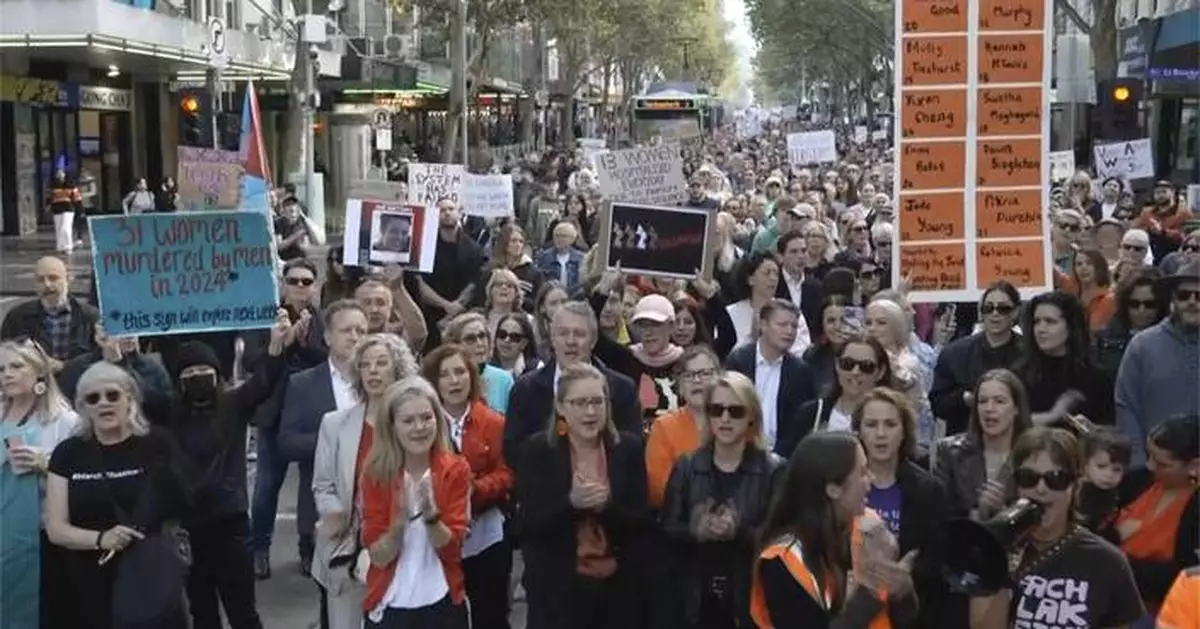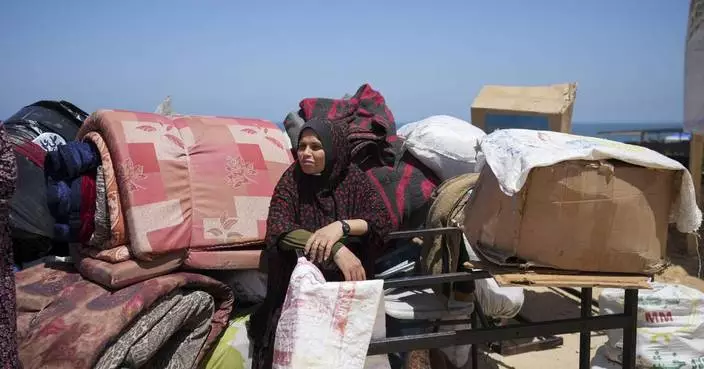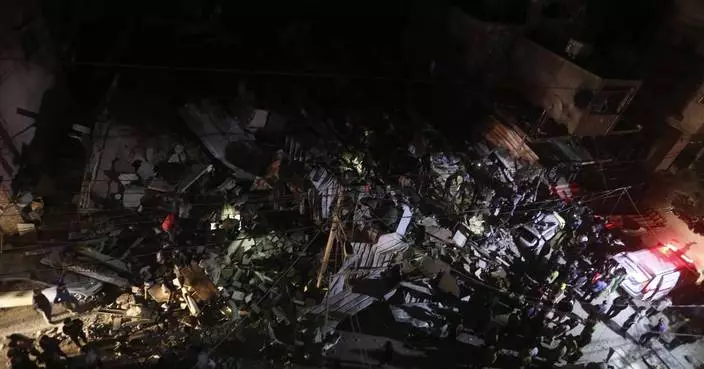CANBERRA, Australia (AP) — Australia’s Prime Minister Anthony Albanese on Monday described domestic violence as a “national crisis” after thousands rallied around the country against violence toward women.
Thousands protested in cities around Australia on Sunday to draw attention to the deaths of 27 women so far this year allegedly caused by acts of gender-based violence in a population of 27 million.
Albanese said on Monday the rallies were a call to action for all levels of Australian government to do more to prevent gender-based violence.
"Quite clearly, we need to do more. It’s not enough to just have empathy,” Albanese told Nine Network television.
"The fact that ... a woman dies every four days on average at the hand of a partner is just a national crisis,” he added.
There were 17 rallies held across Australia over the weekend, with an estimated 15,000 people demonstrating in the city of Melbourne.
Albanese said he will host a meeting or Australian state and territory leaders on W
ednesday to discuss a coordinated response.
Albanese, his Women’s Minister Katy Gallagher and Social Services Minister Amanda Rishworth received a hostile response when they attended a rally in the capital Canberra on Sunday.
Protesters yelled at the government leaders, “we want action” and “do your job.”
Albanese said there needed to be more focus on perpetrators and prevention of violence. “We need to change the culture, we need to change attitudes — we need to change the legal system,” Albanese told the rally.

In this image made from video provided by AUBC, people march and shout slogans during a protest against gender-based violence, in Melbourne, Australia, Sunday, April 28, 2024. Thousands of people rallied across Australia on Sunday, demanding action to end gender-based violence in the country. (AUBC via AP)

In this image made from video provided by AUBC, people march and shout slogans during a protest against gender-based violence, in Melbourne, Australia, Sunday, April 28, 2024. Thousands of people rallied across Australia on Sunday, demanding action to end gender-based violence in the country. (AUBC via AP)
JERUSALEM (AP) — Palestinians on Wednesday will mark the 76th year of their mass expulsion from what is now Israel, an event that is at the core of their national struggle. But in many ways, that experience pales in comparison to the calamity now unfolding in Gaza.
Palestinians refer to it as the Nakba, Arabic for catastrophe. Some 700,000 Palestinians — a majority of the prewar population — fled or were driven from their homes before and during the 1948 Arab-Israeli war that followed Israel's establishment.
After the war, Israel refused to allow them to return because it would have resulted in a Palestinian majority within its borders. Instead, they became a seemingly permanent refugee community that now numbers some 6 million, with most living in slum-like urban refugee camps in Lebanon, Syria, Jordan and the Israeli-occupied West Bank.
In Gaza, the refugees and their descendants make up around three-quarters of the population.
Israel's rejection of what Palestinians say is their right of return has been a core grievance in the conflict and was one of the thorniest issues in peace talks that last collapsed 15 years ago. The refugee camps have always been the main bastions of Palestinian militancy.
Now, many Palestinians fear a repeat of their painful history on an even more cataclysmic scale.
All across Gaza, Palestinians in recent days have been loading up cars and donkey carts or setting out on foot to already overcrowded tent camps as Israel expands its offensive. The images from several rounds of mass evacuations throughout the seven-month war are strikingly similar to black-and-white photographs from 1948.
Mustafa al-Gazzar, now 81, still recalls his family's monthslong flight from their village in what is now central Israel to the southern city of Rafah, when he was 5. At one point they were bombed from the air, at another, they dug holes under a tree to sleep in for warmth.
Al-Gazzar, now a great-grandfather, was forced to flee again over the weekend, this time to a tent in Muwasi, a barren coastal area where some 450,000 Palestinians live in a squalid camp. He says the conditions are worse than in 1948, when the U.N. agency for Palestinian refugees was able to regularly provide food and other essentials.
“My hope in 1948 was to return, but my hope today is to survive,” he said. “I live in such fear,” he added, breaking into tears. “I cannot provide for my children and grandchildren.”
The war in Gaza, which was triggered by Hamas' Oct. 7 attack into Israel, has killed over 35,000 Palestinians, according to local health officials, making it by far the deadliest round of fighting in the history of the conflict. The initial Hamas attack killed some 1,200 Israelis.
The war has forced some 1.7 million Palestinians — around three quarters of the territory's population — to flee their homes, often multiple times. That is well over twice the number that fled before and during the 1948 war.
Israel has sealed its border. Egypt has only allowed a small number of Palestinians to leave, in part because it fears a mass influx of Palestinians could generate another long-term refugee crisis.
The international community is strongly opposed to any mass expulsion of Palestinians from Gaza — an idea embraced by far-right members of the Israeli government, who refer to it as “voluntary emigration.”
Israel has long called for the refugees of 1948 to be absorbed into host countries, saying that calls for their return are unrealistic and would endanger its existence as a Jewish-majority state. It points to the hundreds of thousands of Jews who came to Israel from Arab countries during the turmoil following its establishment, though few of them want to return.
Even if Palestinians are not expelled from Gaza en masse, many fear that they will never be able to return to their homes or that the destruction wreaked on the territory will make it impossible to live there. A recent U.N. estimate said it would take until 2040 to rebuild destroyed homes.
The Jewish militias in the 1948 war with the armies of neighboring Arab nations were mainly armed with lighter weapons like rifles, machine guns and mortars. Hundreds of depopulated Palestinian villages were demolished after the war, while Israelis moved into Palestinian homes in Jerusalem, Jaffa and other cities.
In Gaza, Israel has unleashed one of the deadliest and most destructive military campaigns in recent history, at times dropping 2,000-pound (900-kilogram) bombs on dense, residential areas. Entire neighborhoods have been reduced to wastelands of rubble and plowed-up roads, many littered with unexploded bombs.
The World Bank estimates that $18.5 billion in damage has been inflicted on Gaza, roughly equivalent to the gross domestic product of the entire Palestinian territories in 2022. And that was in January, in the early days of Israel’s devastating ground operations in Khan Younis and before it went into Rafah.
Yara Asi, a Palestinian assistant professor at the University of Central Florida who has done research on the damage to civilian infrastructure in the war, says it's “extremely difficult” to imagine the kind of international effort that would be necessary to rebuild Gaza.
Even before the war, many Palestinians spoke of an ongoing Nakba, in which Israel gradually forces them out of Gaza, the West Bank and east Jerusalem, territories it captured during the 1967 war that the Palestinians want for a future state. They point to home demolitions, settlement construction and other discriminatory policies that long predate the war, and which major rights groups say amount to apartheid, allegations Israel denies.
Asi and others fear that if another genuine Nakba occurs, it will be in the form of a gradual departure.
“It won’t be called forcible displacement in some cases. It will be called emigration, it will be called something else," Asi said.
"But in essence, it is people who wish to stay, who have done everything in their power to stay for generations in impossible conditions, finally reaching a point where life is just not livable.”
Associated Press journalists Wafaa Shurafa and Mohammad Jahjouh in Rafah, Gaza Strip, contributed.
Follow AP's coverage at https://apnews.com/hub/israel-hamas-war

A Palestinian man, displaced by the Israeli air and ground offensive on the Gaza Strip, checks a makeshift tent during the dusk at a camp in Deir al Balah, Monday, May 13, 2024. Palestinians on Wednesday, May 15, 2024, will mark the 76th year of their mass expulsion from what is now Israel. It's an event that is at the core of their national struggle, but in many ways pales in comparison to the calamity now unfolding in Gaza. (AP Photo/Abdel Kareem Hana)

A Palestinian man sits next to a fire along with other children as they stand in front of makeshift tents after been displaced by the Israeli air and ground offensive on the Gaza Strip, at camp in Deir al Balah, Monday, May 13, 2024. Palestinians on Wednesday, May 15, 2024, will mark the 76th year of their mass expulsion from what is now Israel. It's an event that is at the core of their national struggle, but in many ways pales in comparison to the calamity now unfolding in Gaza. (AP Photo/Abdel Kareem Hana)

Palestinian children, displaced by the Israeli air and ground offensive on the Gaza Strip, play together as they stand at a makeshift tent camp in Deir al Balah, Monday, May 13, 2024. Palestinians on Wednesday, May 15, 2024, will mark the 76th year of their mass expulsion from what is now Israel. It's an event that is at the core of their national struggle, but in many ways pales in comparison to the calamity now unfolding in Gaza. (AP Photo/Abdel Kareem Hana)

Palestinians displaced, by the Israeli air and ground offensive on the Gaza Strip, stand in a makeshift tent at a camp in Deir al Balah, Monday, May 13, 2024. Palestinians on Wednesday, May 15, 2024, will mark the 76th year of their mass expulsion from what is now Israel. It's an event that is at the core of their national struggle, but in many ways pales in comparison to the calamity now unfolding in Gaza. (AP Photo/Abdel Kareem Hana)

Palestinians displaced by the Israeli air and ground offensive on the Gaza Strip walk along a beach of Mediterranean Sea at a makeshift tent camp in Deir al Balah, Monday, May 13, 2024. Palestinians on Wednesday, May 15, 2024, will mark the 76th year of their mass expulsion from what is now Israel. It's an event that is at the core of their national struggle, but in many ways pales in comparison to the calamity now unfolding in Gaza. (AP Photo/Abdel Kareem Hana)

A Palestinian woman sits in front of her makeshift tent with her grandchildren after been displaced by the Israeli air and ground offensive on the Gaza Strip at a camp in Deir al Balah, Monday, May 13, 2024. Palestinians on Wednesday, May 15, 2024, will mark the 76th year of their mass expulsion from what is now Israel. It's an event that is at the core of their national struggle, but in many ways pales in comparison to the calamity now unfolding in Gaza. (AP Photo/Abdel Kareem Hana)

FILE - Displaced Palestinians arrive in central Gaza after fleeing from the southern Gaza city of Rafah in Deir al Balah, Gaza Strip, on Thursday, May 9, 2024. Palestinians on Wednesday, May 15, 2024, will mark the 76th year of their mass expulsion from what is now Israel. It’s an event that is at the core of their national struggle, but in many ways pales in comparison to the calamity now unfolding in Gaza. (AP Photo/Abdel Kareem Hana, File)

Displaced Palestinians arrive in central Gaza after fleeing from the southern Gaza city of Rafah in Deir al Balah, Gaza Strip, on Thursday, May 9, 2024. Palestinians on Wednesday, May 15, 2024, will mark the 76th year of their mass expulsion from what is now Israel. It’s an event that is at the core of their national struggle, but in many ways pales in comparison to the calamity now unfolding in Gaza. (AP Photo/Abdel Kareem Hana)

FILE - Displaced Palestinians arrive in central Gaza after fleeing from the southern Gaza city of Rafah in Deir al Balah, Gaza Strip, on Thursday, May 9, 2024. Palestinians on Wednesday, May 15, 2024, will mark the 76th year of their mass expulsion from what is now Israel. It’s an event that is at the core of their national struggle, but in many ways pales in comparison to the calamity now unfolding in Gaza. (AP Photo/Abdel Kareem Hana, File)

FILE - Displaced Palestinians arrive in central Gaza after fleeing from the southern Gaza city of Rafah in Deir al Balah, Gaza Strip, on Wednesday, May 8, 2024. Palestinians on Wednesday, May 15, 2024, will mark the 76th year of their mass expulsion from what is now Israel. It’s an event that is at the core of their national struggle, but in many ways pales in comparison to the calamity now unfolding in Gaza. (AP Photo/Abdel Kareem Hana, File)





















